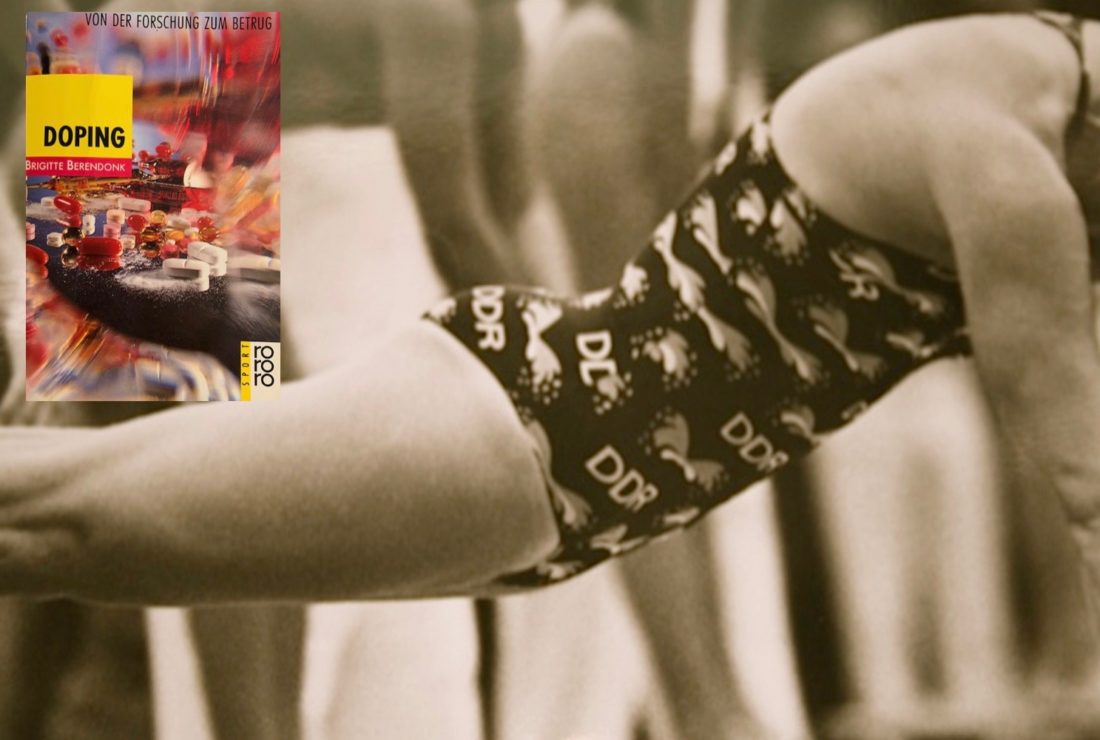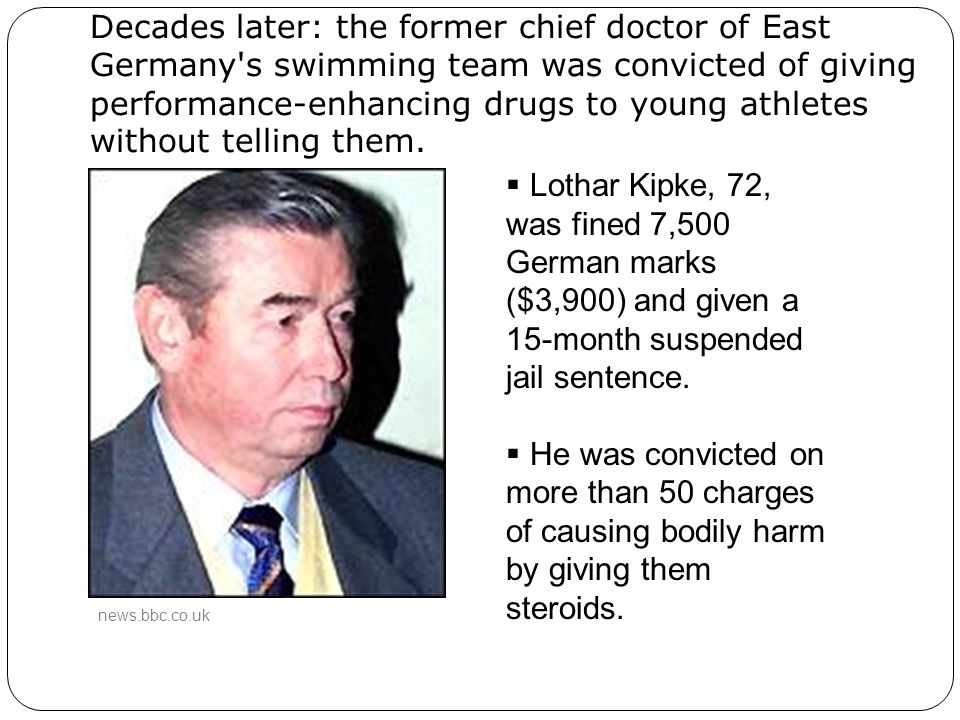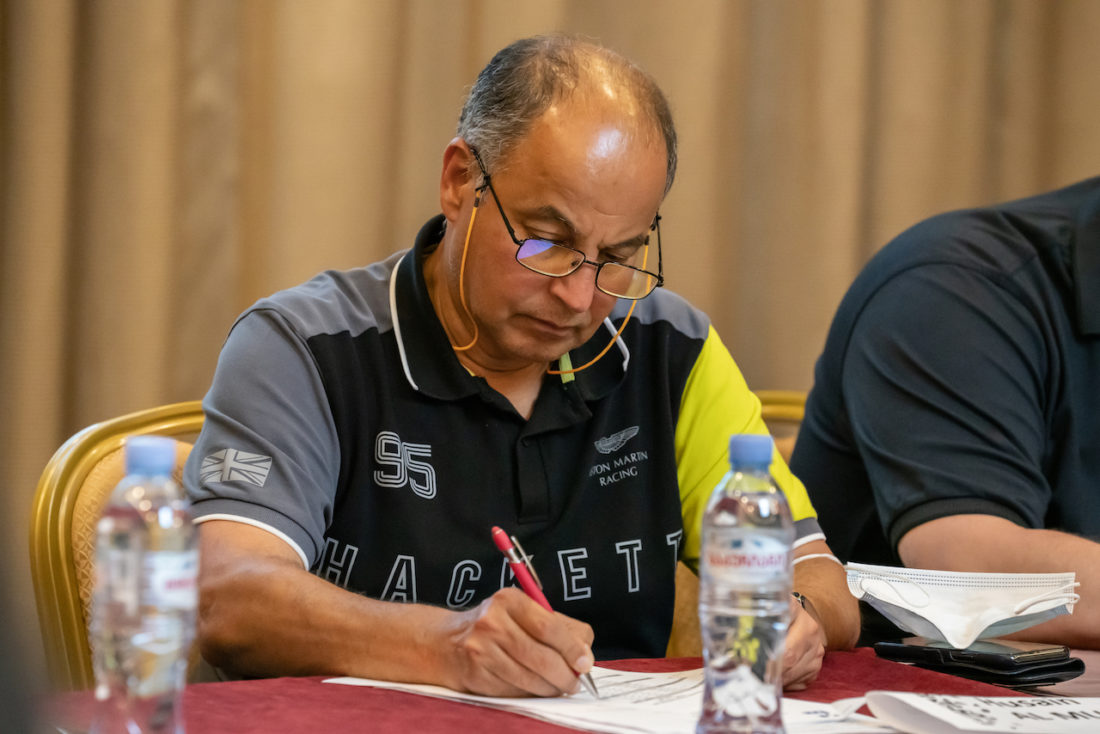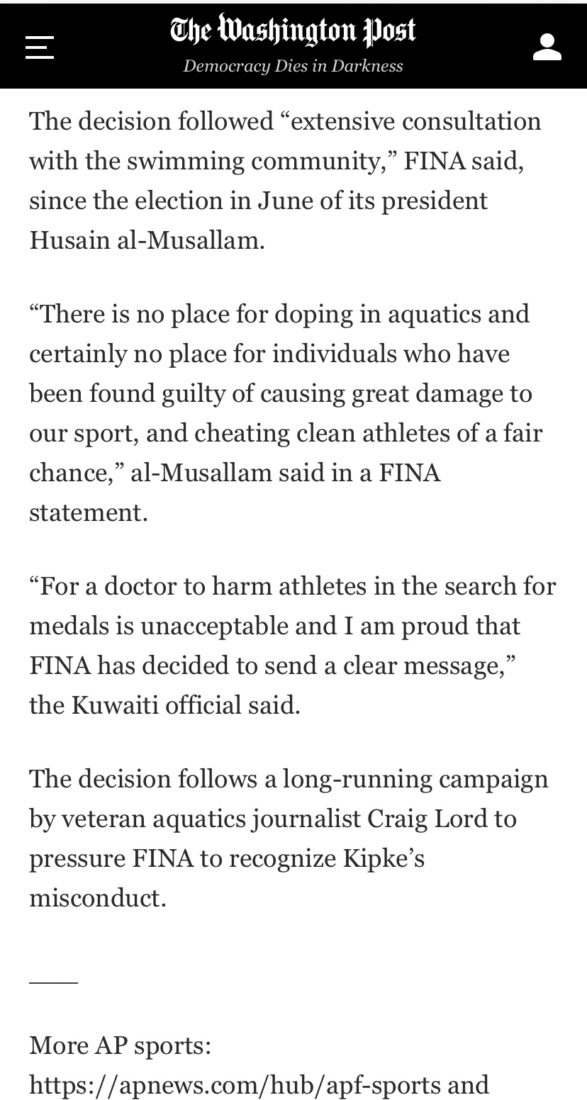FINA Finally Sends Strong Message In Reform Process By Stripping “Disgraced” GDR Dr. Lothar Kipke Of 1980s Honour 20 Years After Criminal Conviction

The ruling FINA Bureau, the top table of global swimming governance, has voted unanimously to strip Dr. Lothar Kipke of the honour bestowed on him in the 1980s when he was a member of the Medical Commission abroad but one of the chief operators of the German Democratic Republic’s State Plan 14:25 systematic doping program behind the Berlin Wall.

The FINA decision comes 20 years after Kipke was criminally convicted for his involvement in state-prescribed doping in GDR sport, swimmers among those most affected. Kipke was served a suspended sentence and fined for his key role in administering anabolic steroids to underage athletes, most of them teenage girls.
Kipke’s removal from the list of Gold and Silver “Pin” winners for services to swimming is the first big step in righting the wrongs of the GDR doping era since a FINA Reform Committee recommended last month that the global regulator establish an independent Aquatics Integrity Unit to shine a light into dark corners that the self-regulation model in place at FINA for decades failed to acknowledge.
What would be found by a Berlin court to be the crimes of Lothar Kipke were highlighted by this author in articles in The Times and Sunday Times in the 1990s – after an interview with Kornelia Ender in 1991 (her first in an English-language publication after the fall of the Berlin Wall) and, in the digital age, at SwimNews in the period 2000-2012 with fellow journalist Karin Helmstaedt, one of the few to cover the entire GDR doping trials between 1998 and 2001, and subsequently at SwimVortex and here on SOS in the past decade.
In 2014, this author quit the FINA Media Committee after there was no response to a unanimous vote of the group to ask FINA leaders to consider the plight of those on both sides of the Cold War in the pool, embrace a reconciliation process and strip Kipke of an honour that served as a living insult to all those affected by the GDR’s doping program.
That request from the Media Committee, written by this author and stacked with damning evidence, elicited no response from FINA leaders, including a few members ion the executive who just nine month later voted to grant Vladimir Putin the highest honour of FINA, the FINA Order, on the cusp of revelations of the biggest doping scandal in Olympic sport since the days of the GDR.
In an interview with Husain Al-Musallam, the FINA president, two months ago, the new man at the top revealed that the Media Committee request had never made it to the top table for consideration, by his recollection. That would mean that the request mad it no further than the then Bureau liaison officer Tamas Gyarfas, president of the Hungarian swimming federation, and Cornel Marculescu, the then director who stepped down after 35 years at the helm earlier this year.
Al-Musallam said that he was “appalled” and pledged to have the Bureau vote on the matter of Kipke at the next available opportunity. That came with the latest Bureau meeting, which ended in the following statement:
FINA Bureau votes to remove disgraced doctor Lothar Kipke from FINA honours list
The FINA Bureau has unanimously voted to remove Dr. Lothar Kipke from the FINA honours list, effective immediately. Kipke was convicted for the leading role he played in doping East German swimmers in the 1970s and 1980s. Following the election of FINA President Captain Husain Al-Musallam, and based on extensive consultation with the swimming community, FINA promised a swift response to the matter.
Said FINA President Al-Musallam:

“There is no place for doping in aquatics and certainly no place for individuals who have been found guilty of causing great damage to our sport, and cheating clean athletes of a fair chance. For a doctor to harm athletes in the search for medals is unacceptable and I am proud that FINA has decided to send a clear message.”
Husain Al-Musallam – going to work on reform – Kipke now gone
Kipke had received a FINA award in the 1980s as a former member of the FINA Medical Commission, long before his extensive wrongdoing came to light.
“FINA will continue to listen carefully to the swimming community as we address FINA’s actions of the past while delivering reforms for the future. I am fully confident that the measures we are implementing mean that aquatics athletes can be sure of FINA’s determination to protect clean athletes and promote clean sport.”
Husain Al-Musallam
The GDR era was the darkest in swimming history, the horrid consequences of systematic doping alive and kicking in generations of women to this day. Justice is yet to be done. Reconciliation is now on the table, the process likely to only gather pace with the promised establishment of an independent Aquatics Integrity Unit if such a body if given the powers of considering retrospective wrongs on the super-scale of matters that harmed thousands of swimmers in the 1970s and 1980s and has been a thorn in the side of those people, coaches and families throughout their lives.
Kipke Background and the GDR Doping Scandal In Brief:
- Where his role began: In 1971, Kipke, a former member of the Nazi Party, took part in he inaugural meeting of the sports medicine control group for the Olympic Games. There they exchanged ideas about anabolic steroids. The agents were not detectable in the urine and are therefore not “doping” agents. He reported to the DTSB that the effects had been “favourable” and “it was […] advised which group of athletes would get which preparations in the future” at the Research Institute for Physical Culture and Sport in Leipzig. Between 1971 (some references earlier) and 1989, it is estimated that 10,000 athletes across many sports were administered with anabolic steroids and other banned substances, some of which were tested on “lesser” athletes without clinical trials having been conducted and with the intention of giving more tried and tested drugs to athletes primed for big podiums
- Conviction for doping in the GDR: Kipke was sentenced in January 2000 by the Berlin Regional Court to a prison sentence of 15 months for his involvement in state-ordered doping in competitive sports in the GDR. The then 72-year-old had confessed to having been involved in 58 cases between 1975 and 1985 in the administration of anabolic steroids to underage swimmers to improve performance and without medical indication. The doping plans were worked out by Kipke and, after approval by Chief architect of 14:25 Manfred Höppner, the administration of injections and oral turinabol went ahead, sometimes closely observed, sometimes administered by Kipke himself. His own Stasi (state police) observer reported back to HQ that Kipke was “brutal” in his treatment of the young athletes he abused.
- Fined and forced to pay costs: In court in 2001, he was also ordered to pay a token 7,500 marks to a non-profit organisation and had to bear the costs of the proceedings, a much higher sum.
- Unofficial employee of ‘State Security’: Kipke was an unofficial employee of the GDR State Security under the code name Rolf. He reported to the State Security about methods of compulsory doping in GDR competitive sport. Giselher Spitzer‘s authoritative and academic works on the GDR doping program describe Kipke as one of the highest ranking and most willing officers in the whole sorry and dark chapter of sports history. Kipke’s records, including names of athletes, doctors and coaches as well as dosages and the details of banned substances administered, were used as evidence in the trials of forced doping in competitive sport in the GDR in the 1990s.
- The Book That Broke The News On The Depth Of The Deceit: Brigitte Berendonk, who with her husband Prof. Werner Franke helped save the evidence of GDR state doping from the shredders, penned the first authoritative book on the Sporting Crime of the 20th Century: Doping: From Research To Fraud. From the early 1990s, the evidence was all there.
Comment: Bravo! It takes courage to admit that 20 years of leadership simply got it wrong. The removal of Kipke’s honour was always a no brainer; was always the right thing to do. Now its’ been done, thanks to the drive of Husain Al-Musallam and the influence he is having on a top table of aquatics sport that has shied away from the ghosts of a horrible history for far too long and ostracised those calling for the change of culture required to lift FINA off the bottom of the league table of governance in Olympic sports.

The first step is often the hardest. It happened because a FINA president showed leadership and those working with him put their shoulder to welcome communication skills and embraced decency and integrity.
Keep going Al-Musallam and new director Brent Nowicki, live up to that pledge of removing any who cannot make the cultural shift required – and grant that pending Integrity unity the powers to hear the voices and claims of the athletes harmed by the crimes of others met by the silence and inaction of leaderships that should and could have done far more to heal the wounds a long time ago. Better late than never.
FINA may one day become World Aquatics, or similar. That will matter greatly if it holds hands with the cultural shift that can convert the global regulator for swimming and its sibling sports into a role-model federation not a rogue organisation that serves as a haven for bad politics and practices that harm the prime asset – athletes – along with many others.
Meanwhile, thanks to Graham Dunbar of the AP for this recognition, to the right, published in the Washington Post and elsewhere.